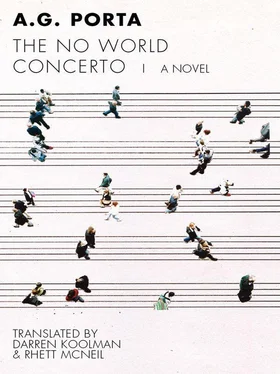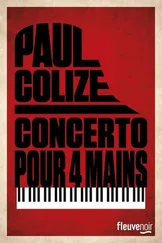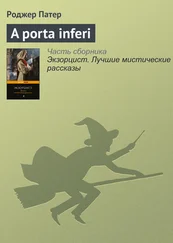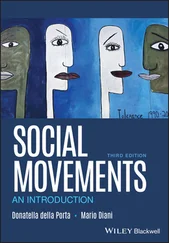A. Porta - No World Concerto
Здесь есть возможность читать онлайн «A. Porta - No World Concerto» весь текст электронной книги совершенно бесплатно (целиком полную версию без сокращений). В некоторых случаях можно слушать аудио, скачать через торрент в формате fb2 и присутствует краткое содержание. Год выпуска: 2013, Издательство: Dalkey Archive Press, Жанр: Современная проза, на английском языке. Описание произведения, (предисловие) а так же отзывы посетителей доступны на портале библиотеки ЛибКат.
- Название:No World Concerto
- Автор:
- Издательство:Dalkey Archive Press
- Жанр:
- Год:2013
- ISBN:нет данных
- Рейтинг книги:4 / 5. Голосов: 1
-
Избранное:Добавить в избранное
- Отзывы:
-
Ваша оценка:
- 80
- 1
- 2
- 3
- 4
- 5
No World Concerto: краткое содержание, описание и аннотация
Предлагаем к чтению аннотацию, описание, краткое содержание или предисловие (зависит от того, что написал сам автор книги «No World Concerto»). Если вы не нашли необходимую информацию о книге — напишите в комментариях, мы постараемся отыскать её.
, Vila-Matas's
, and Marías's
is a many-layered puzzle concerning an old screenwriter who has holed up in a shabby hotel in a never-named but familiar city in order to write a script about his lover — a young piano prodigy who wants in turn to give up music and become a novelist, and who believes she may be in contact with creatures from another world. Ambition, lust, hate, and the need to create all combine to make up a potent depiction of youth — and age — lost in a labyrinth of their own making.
Sinister and erotic, shifting restlessly between realities, and populated by conspirators both real and imagined,
is an investigation of the limits of language, storytelling, and the known world, set against a backdrop of empty concert halls and hazy foosball bars. It is the first of A. G. Porta's books to appear in English, finally joining those of his early writing partner and devotee Roberto Bolaño.
No World Concerto — читать онлайн бесплатно полную книгу (весь текст) целиком
Ниже представлен текст книги, разбитый по страницам. Система сохранения места последней прочитанной страницы, позволяет с удобством читать онлайн бесплатно книгу «No World Concerto», без необходимости каждый раз заново искать на чём Вы остановились. Поставьте закладку, и сможете в любой момент перейти на страницу, на которой закончили чтение.
Интервал:
Закладка:
The Little Sinfonietta has only a few concerts to go before embarking on their tour of the major cities and provinces. Later on, they plan to return and perform a few more concerts in the capital. The radio DJ announces the dates slowly, with a pause between each, which is to suggest he won’t be repeating them. Then he asks what the difference is between the young conductor of the Little Sinfonietta and all the other young conductors on the scene. The brilliant composer answers for him, saying it’s not only in the way he leads the orchestra, but in his manner of conducting, which has all the hallmarks of a great maestro, that sets him apart form the rest, and more besides, for he promises to one day surpass the great maestros as well. He illustrates his point by describing the way he conducts his No World Symphony . The DJ asks if after all the success, given their youth, there’s any time left to have some fun. The young conductor answers this time, saying everything’s a game, even this interview, and life itself. The girl thinks about abandoning this mantra once and for all, not because of an aversion to the idea motivating it, but because she wants to distance herself further from these so-called friends whom, lately, she’s come to detest. She doesn’t want anything she sees, hears, or even thinks about to remind her of their existence. A strange way to finally sever all association with them, she thinks, noting the contradiction in arriving at the resolution while listening to them being interviewed on the radio. The future is happening now, says the young conductor, and this is evident in the compositions of the brilliant composer. He then makes allowances for the ex-pianist turned writer. At this point, the listeners, and probably the whole world, are aware of her new obsession. It wouldn’t surprise him if she signed a contract with some major book publisher, he says, despite the fact she’s written nothing yet. Especially if her mother finally comes to terms with her change of vocation. The girl listens attentively. A moment of absurdity, she thinks. It’s as if she’s sitting there with them, or perhaps they know she’s listening. Doubt leads her to think it might be an old pre-recorded interview from before there was any malice between them. But she quickly dismisses this, since she doesn’t remember any such interview taking place. She looks at herself in the mirror. She’s so accustomed to her reflection it’s become invisible to her, although she still knows where her head is; what that head is thinking — that she doesn’t care what they say; that she should forget about them, and think again about the vigil in the Grand Central Station. A writer shouldn’t rely on inconsistent premises, she thinks, like her friends. Reality is different. If the young conductor really believes life’s a game, he should prove it or shut up about it — stop trumpeting it around like the latest fashion, trying to get noticed by inciting controversy. All the young conductor truly believes in is himself and his music. The girl still doesn’t understand why he complimented her on the radio. She’d like to see it as a belated act of recognition. And yet, his being a musician, and her being a writer, gives them very different conceptions of the world. This is a valid argument. And what about the brilliant composer? What does he think about? She sees the little guy, seated with the rest of the group around a large oval table, wearing headphones, perhaps perched on a chair with several cushions so he can see the interviewer. She laughs, imagining the DJ’s face moving swiftly between his script and the so-called brilliant kid, sitting on those cushions, swinging his legs above the floor, having to strain to reach the microphone. Nothing, the composer finally says, he believes in nothing because nothing’s worth believing in. He sits back in his chair. I’ve read somewhere that you can hear voices, says the interviewer to her replacement, the latest conquest. Is it true that you said they’re voices from another world? The girl can’t breathe. It’s if she just received a sucker punch to the stomach. The latest conquest says she was talking about voices that pronounce her name with a “ka.” She doesn’t know what this signifies yet, but she’s working on it. The girl can’t bear to continue listening, so she turns the radio off. Are they going to transform her replacement into a writer as well? Will they eventually cancel her performances too, and introduce her to another replacement, another impersonator, a plagiarist, an impostor? She dials the young conductor’s number. She notices her father’s pistol, half-hidden in one of the laptop case’s compartments, so she reaches in and grips it tightly, angrily. She should go to the church and declare herself perfectly healthy and ready to perform the 5 Pieces for piano . What they told the public is all lies. They canceled her performances out of their own personal interests. They really are all monsters, she thinks. They’ll go out of their way to wreck her career — not only as a pianist, but as a writer too — to rob her of a future. The line’s busy. She hangs up, breathing heavily, as if she’s just finished a long-distance run. She swears to give up her mantra at some point in the future, but not yet. Not while she still needs it. If something goes wrong, she repeats, it’s not that important, because it’s only part of a game. Everything’s a game. Life is only a game.
The screenwriter searches for the black prostitute he was with on Wednesday night, or perhaps he should say the early hours of Thursday morning. He searches first around the sex shop then walks a couple of blocks, but he doesn’t see her. So he decides to go back and wait for her at the club. It’s still the early afternoon, perhaps too early to go cruising, but he decides to stay a while. After ordering a gin and tonic and lighting a cigarette, he thinks about the girl’s father. If the screenwriter was he, or at least had his money, he’d have the prostitute all to himself. She wouldn’t have to go out soliciting anymore. Some women can smell money on a man. Prostitutes make a living with this talent. He rests his elbow on the bar and lets his eyes dart around the room, as if waiting for someone to show up. The women are all young, are all taken. The black prostitute will show up when he least expects it, he thinks, while crushing the butt in the ashtray. Or perhaps he’s just hoping against hope she will. He hesitates to light the next cigarette, prestidigitates it between his fingers, as if waiting for someone to light it for him, but he soon bores of this game, and ends up lighting it himself. He spends a few more minutes looking at the bottles on the shelves, the lights, the stools, and the pattern on the carpet. Then he goes to take a sip from his glass, but only fishes up an ice cube. He decides against ordering another drink. He decides against finishing his cigarette. Instead, he just gets up and leaves, walks slowly out onto the street, and goes to wait for the prostitute at the sex shop, where he can rest his aching back against the shutter. He looks around at the other women, but none attract his interest. A blonde approaches him. She doesn’t say she wants a light, but insinuates by brandishing an unlit cigarette, and thumbing an invisible lighter. He obliges her, and asks about her dark-skinned colleague. She says she hasn’t seen her all day, and she returns to her post a few meters away. The screenwriter decides to enter the sex shop and have a look around, but he soon bores of this, and goes back outside to smoke another cigarette. Then he smokes another, and another, thinking all the time about the black prostitute, but it seems this isn’t going to be his day, and no one else is even bothering to ask him for a light, so he finally decides to go. He thinks about the girl’s father, who wouldn’t have spent a minute waiting on that miserable street. He’d be lying on his bed in a plush hotel room talking on the phone, arranging an assignation with the college chick. He remembers seeing something similar in a movie, but he decides to use the idea anyway. After all, it’s only a subplot. Do they really advertise college chicks as private escorts in the newspaper? Why not dispense with the scenario and think of another one? During McGregor’s shift in the Grand Central Station, the girl’s father and the chick are having dinner in a classy restaurant. They talk about all kinds of things, but the screenwriter hasn’t yet decided what they are. The day they met, they spoke about jazz, but now he’s not sure. Maybe they should’ve spoken about something else. He thinks about changing the dialogue. Then he thinks again. It’s all the same, he says, the plan of the scene is perfect, so it really doesn’t matter what they talk about. He returns to the restaurant. She’s the same age as his daughter, thinks the father, maybe a couple of years older. Not that this bothers him in the slightest. In fact, he seems to like it. It makes him feel younger. And it doesn’t even occur to him what they’re doing might be wrong. The next shot takes place in a hotel room. A far more luxurious hotel than the ones the father habitually stays in. He sees a book peeking out of the chick’s handbag, which is lying on the other side of the bed, whose title he can just about make out. He points to it, and she recites the beginning from memory. He asks her to account for the book’s having made such an impression on her. She says she remembers because she makes a hobby of collecting and memorizing the beginnings of books, all of which she records in her notebook. If they meet up again, she promises to bring it with her. She further explains that the sentences she memorizes are all the openings of famous novels, and although she sometimes misremembers, mistakes certain words for others, she can always recall the general sense of the quotation. The father decides to challenge her — not only to test her claim, but to determine the quality of the novels she reads. He asks her to quote the beginning of a certain novel. She responds, “Stately, plump. .” Satisfied, he challenges her with another. She says, “For a long time I used to go to bed early. Sometimes, when I had put out my candle, my eyes would close. .” The girl’s father is genuinely surprised that a young escort, basically a high-class hooker, can quote with ease the beginnings of two of the greatest novels ever written, and he’s impressed that she was able to prove that she is indeed cultured, refined, sophisticated, just as she claimed. What would the author who was obsessed with jealousy and the passage of time think of a prostitute quoting his novel from memory? He’d no doubt be flattered, but the young college chick doesn’t give the girl’s father much time to think about it, because she’s already quoting another: “One summer afternoon Mrs. Oedipa Maas came home from a Tupperware party whose hostess had put perhaps too much kirsch. .” Do you know what that is? she asks. He says he doesn’t know, or maybe he doesn’t remember. That’s how most novels begin, she replies, with the author not knowing, plagued by uncertainty. As she undresses, she recites a medley of openings passages: “I first met Dean not long after my wife and I split up.” The girl’s father suspects the young college chick wants to be a writer like his daughter, although he doesn’t mention this. The chick’s hair is short, styled to resemble an organized mess, according to the latest fashion. He doesn’t want to know her age, in case she’s younger than she looks. The screenwriter imagines her as young as possible without having a precise age in mind. What attracts him most about these little gamines is their youth, perhaps because they remind him of all the students he’s slept with. He thinks of the girl’s delicate skin, her wild hair, and tries to remember if his desire for these things only came after sleeping with her. He tries to think of the other students he was with, and all the women he picked up, whatever the asking price. He can’t seem to remember their faces. Memory can be fragile in certain cases, he thinks. It doesn’t matter to him whether the sex is free or paid for. Sex is sex. Besides, he thinks if he doesn’t pay for it one way, he’ll end up paying for it in another. His whole life has been a continuous drifting from woman to woman, an aimless floating from pier to pier, as a boat without oar or anchor, unable to come into the shallows and berth, to get close enough to learn more than perhaps a name. He could almost say he moves from one woman to the next as he does from one screenplay to the next. And this is how he remembers the past, for each screenplay is a climax in the chronicle of his life, each one reminds him of the state of mind he was in when he wrote it, whether he was happy or sad, in or out of love, if he was young and distinguished, or, as he is now, old and semi-retired — a part-time screenwriter who barely gets commissions anymore — whose life is an aimless drifting from pier to pier, unable to berth. He feels no one can fully understand this aspect of his biography but himself, or maybe someone like himself. He doesn’t want to think about it anymore. The screenwriter returns to his story, and imagines the next shot being of the girl’s father and the college chick making love on an elegant bed with gray satin sheets. Her firm, round breasts joggling rhythmically as she rides him, tempered only by his up-reaching hands, grasping them, caressing them. The screenwriter develops an erection as he writes. And then the college chick declaims at the top of her voice, “Stately, plump. .” and “For a long time I used to go to bed early. .” and occasionally groans, “Oedipa Maas” or “Tupperware.” She may be only simulating the groans. At the end of the day, it doesn’t matter. It’s only a movie. The actress who plays her part will be simulating anyway.
Читать дальшеИнтервал:
Закладка:
Похожие книги на «No World Concerto»
Представляем Вашему вниманию похожие книги на «No World Concerto» списком для выбора. Мы отобрали схожую по названию и смыслу литературу в надежде предоставить читателям больше вариантов отыскать новые, интересные, ещё непрочитанные произведения.
Обсуждение, отзывы о книге «No World Concerto» и просто собственные мнения читателей. Оставьте ваши комментарии, напишите, что Вы думаете о произведении, его смысле или главных героях. Укажите что конкретно понравилось, а что нет, и почему Вы так считаете.












